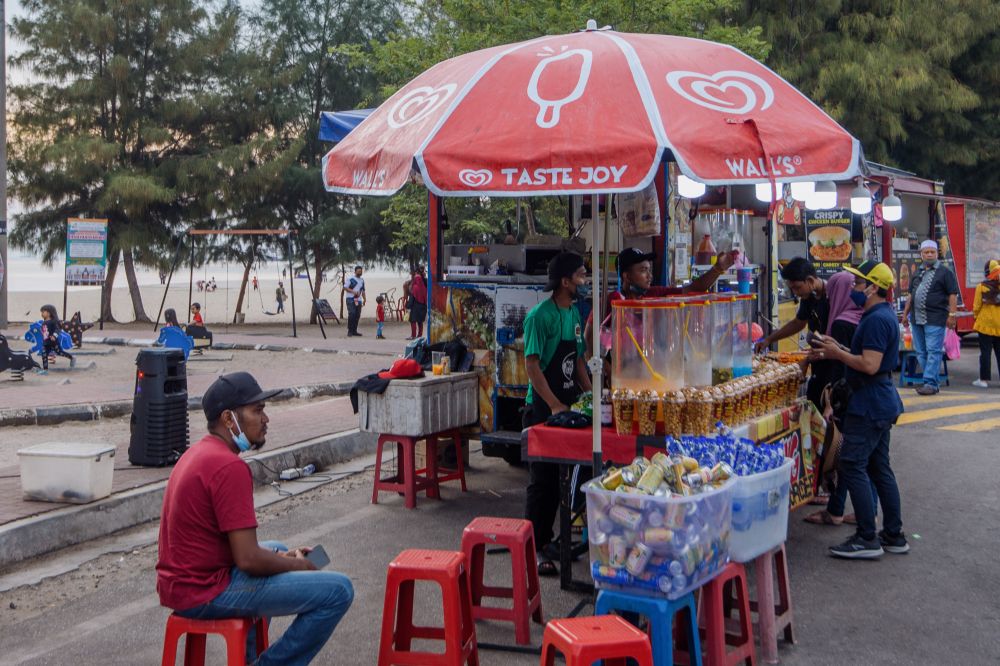MELAKA, Nov 19 — Mentions of Kelebang (the official spelling of the state constituency) inevitably conjure up thoughts of Klebang Beach and the Klebang Coconut Shake, which were among the state’s biggest tourism attractions.
Part of the Klebang district located between Melaka Town and Sungai Udang, the constituency is split between Klebang Kecil and Klebang Besar.
Largely semi-rural, the village homes that dominate the area are interspersed with more modern looking buildings. Tucked amongst them are businesses that mainly cater to tourists and the occasional local.
While the area’s characteristic may not be clear-cut, one thing that will be patent to observers is that residents here are mainly Malay, which is reflected by the 70 per cent representation the community has among the seat’s registered voters.
Despite this, however, not many might know that this particular seat has had a Chinese elected representative for every term since it was first contested in 2004.
While communal politics continues to be the mainstay in the country, Kelebang has somehow managed to buck the trend.
According to utility facilities supervisor Omar Karim Abdullah, 65, a candidate’s race should not be a major consideration and it was past time that Malaysians stopped focusing on each other’s differences.
“Let’s take a look back to when it was in the 1970s and 1980s, where all of us were more united back then.
“I could eat in your house, while you could eat in mine without any problems,” said Omar when met at his workplace in Klebang Besar.
A native here, he recalled a time when racial polarisation was not as severe as now.
“I don't represent the views of all the residents here, but I do believe that the majority of voters here know who they want to be their representative without going into unrelated matters such as race,” said Omar.
A resident who asked to be named only as Yeow concurred and said what mattered was that an elected representative must prioritise the interest of his constituents.
“I personally don’t have a problem as I believe that we are living in a multi-cultural society with established laws and anyone can represent us.
“We have been independent for more than 64 years, so I have never seen the issue of race as a problem,” he said when met at the carpark area of Kelebang Besar here recently.
Since its creation in 2004, Kelebang has been a battleground between MCA and DAP, with the latter finally winning for the first time in 2018, when incumbent Datuk Gue Teck won under the Pakatan Harapan (PH) ticket in a three-cornered contest with Barisan Nasional’s Datuk Lim Ban Hong and Mohd Syafiq Ismail from PAS.
Kelebang’s anomalous representation could be because voters such as Rosnah Samsudin, 49, believed that the prosperity of all residents depended on how well the constituency’s tourism-driven economy could be developed for all.
She noted businesses in the area, like most of the country, have been hit hard by the Covid-19 pandemic and were deeply in need of support.
Brushing aside questions about the candidates’ ethnicity, she said she did not care so long as the person could look after the area’s traders and has ideas on how to modernise the constituency, especially the beach that was still a major tourism destination.
“So, the potential candidate has to look into not only the resident woes, but also the welfare of the traders and those that eke out a living in this area,” said Rosnah.
“We need an elected representative who can look into rebuilding the Kelebang area to make it lively before the pandemic.”
Such views were echoed by other traders in the area, who stressed that bread-and-butter concerns were of greater significance than ethnicity.
“For us, the representative’s race is not important as we must be assured that if any assistance comes it will be on an equal basis for all traders,” said 62-year-old nasi campur trader Ida Medan, who hoped the next assemblyman could look into financial assistance for her group.
Others such as brothers Joret Baba, 60, and Norazli Baba, 49, said Melaka residents have learned to judge candidates not by their ethnicity alone, but their potential for service.
Given the current climate, Norazli said an elected representative who understood the local economy and how to stimulate it would be the priority.
He said the mostly Malay Kelebang residents were not particular about a candidate’s race, even before the existence of the constituency.
“Janji boleh buat kerja (As long as he can put in the work),” he said.
Still, Joret said it might ultimately not matter to him at all. Like a significant section of voters who were expected to sit out the election, he said he was considering not voting at all on Saturday.
“I am not keen and I don’t think my vote can make a difference anyway. All that we want is to carry on with our lives,” he said without elaborating.
.jpeg)
According to Shafezah Abdul Wahab, a senior lecturer at Universiti Teknologi Mara’s Faculty of Communication and Media Studies at its Melaka branch, Kelebang demonstrated that Malaysian politics could easily be colour blind.
“Such representation represents all communities, regardless of ethnicity,” said Shafezah who is also a Melaka state election political observer.
Kelebang will see a three-cornered contest between Lim (BN-MCA), incumbent Gue Teck (PH-PKR) and Bakri Jamaluddin (PN-PAS).
The Kelebang constituency is among the main seats to watch as it has been among the seats that will see a close fight between PH and BN.
MCA under BN has said that it expects to recapture Kelebang, Machap Jaya, Bemban and Kesidang for the state election.
The 12-day campaigning period will end tonight and voting will take place tomorrow.

















.JPG)
.JPG)
.JPG)


